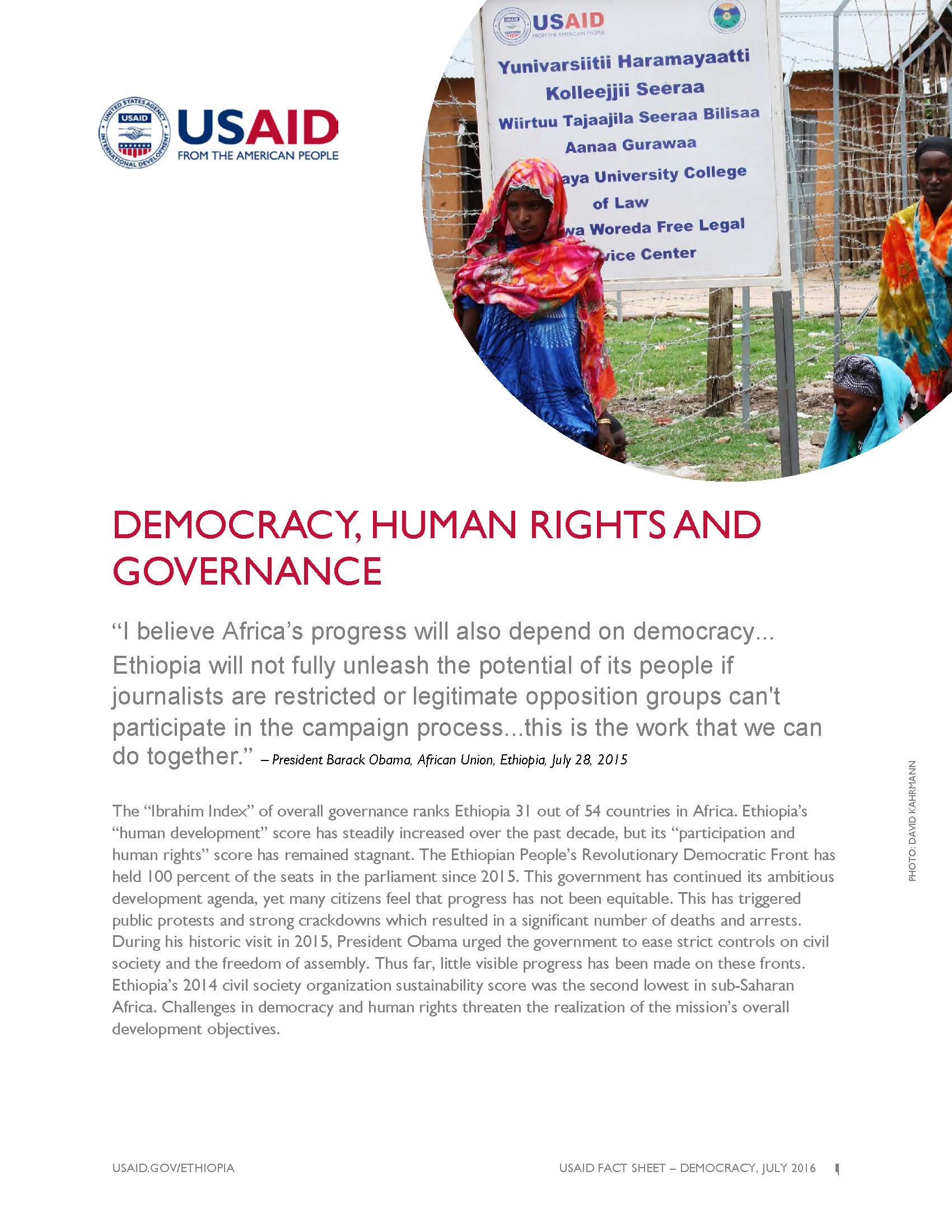
The Ibrahim Index of overall governance ranks Ethiopia 31 out of 54 countries in Africa. It reports a slight imbalance between the four areas contributing to the Index: Safety & Rule of Law, Participation & Human Rights, Sustainable Economic Opportunity and Human Development. This imbalance continues to grow. The Ethiopian People’s Revolutionary Democratic Front holds 100 percent of the seats in parliament and has continued its ambitious development agenda, yet many citizens feel that progress has not been equitable. This has triggered public protests and strong crackdowns, which resulted in a significant number of deaths and arrests since late 2015, culminating in the government’s institution of a state of emergency in October 2016. The state of emergency is still in effect restricting a number of activities, including protests and public gatherings. Ethiopia’s 2015 civil society organization sustainability score was the second lowest in sub-Saharan Africa. Challenges in democracy and human rights threaten the realization of the mission’s overall development objectives.
Programming
We collaborate with government at the national, regional and district levels and with universities and civil society. This includes working with local communities and the Government of Ethiopia to prevent and manage conflict. Closely linked to these efforts is assistance to enhance good governance by supporting the government’s focus on building accountable institutions, thereby promoting transparency and public accountability. The mission is also building the ability of local student peace actors on university campuses to help youth constructively resolve conflict through dialogue.
We provide continuing education to the judiciary on human rights and application of the law, improves public access to justice through legal aid and education, and facilitates non-violent means to resolve disputes. We also promote and support the role of local organizations as key partners in Ethiopia’s development by financing their work or providing capacity building assistance to improve their operations, organization and program implementation.
To sustain major development gains, we plan to better address underlying governance issues that impact development success across the mission portfolio.
Activities Include
-
Access to Justice and Legal Awareness: Aims to make a difference in the lives of vulnerable populations including low-income groups, the disabled, and victims of gender based violence by raising awareness of their legal rights and providing them with access to expert legal advice to seek redress and obtain professional representation before a court of law.
-
Enhancing the Status of Human Rights Protection and Systems of Good Governance in Ethiopia: Builds the ability of Ethiopian judicial and law enforcement authorities to improve the quality of justice and enforcement of human rights. Via the bi-annual Joined-Up Justice Forum, the activity also provides a platform for justice sector and law enforcement professionals to discuss and reach consensus on common issues connected to their role in interpreting and enforcing the law.
-
Local Capacity Development: Strengthens the capacity of local Ethiopian organizations. This activity provides assistance in the areas of organizational and financial management, activity management, and monitoring and evaluation skills.
-
Strengthening Institutions for Peace and Development II: Establishes and strengthens partnerships between government and communities to understand and address issues that can lead to conflict.
-
Sustained Dialogue: This conflict management and mitigation activity brings together students of diverse identities to interact and engage constructively in a safe space, in order to break down barriers to trust and understanding, and build collaboration around common causes.
-
Ethiopia Social Accountability Program: Supports local populations to hold government service providers more accountable for improved basic service delivery across five sectors, including health, education, rural roads, agriculture and water and sanitation. We plan to fund the third iteration of this multidonor-funded Government of Ethiopia program.









Comment
Make a general inquiry or suggest an improvement.